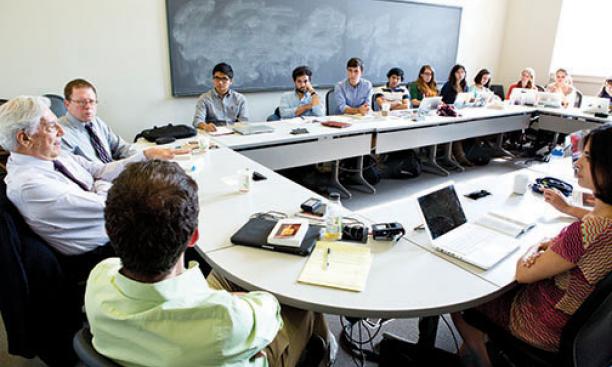

A common refrain of literature students is: “What was the author thinking?” For students in a fall seminar titled “The Literary Works of Mario Vargas Llosa,” the students have the chance to ask the Nobel Prize-winning author exactly that.
Taught by Vargas Llosa and visiting professor Efrain Kristal, the chair of UCLA’s comp lit department, the seminar spans the breadth of the author’s career from his early works to his most recent novel, El Héroe Discreto. Class sessions and readings are in Spanish, and students are expected to read a book a week.
On a Tuesday in early October, the author walked into the room in a crisp blue suit, a cup of Small World coffee in hand. After the students introduced themselves one by one, it was Vargas Llosa’s turn. “I suppose I will present myself,” he said, chuckling. “I’m from Arequipa, Peru, and I am a novelist and a screenwriter.”
With that, the class dove into the discussion of the day: Conversations in the Cathedral, a novel that examines Peru under the dictatorship of Manuel Odría.
“This novel was hard for me to write — I had wanted to tell many stories, but was unsure on how to unite them in a single structure,” Vargas Llosa explained in Spanish. “Then I had the idea of parallel conversations.”
Helena Hengelbrok ’16, who spent a year in Urubamba, Peru, as part of the bridge-year program, had signed up for the class as soon as she learned of it. The discussions with Vargas Llosa gave her bridge-year experiences “a historical context,” she said.
Vargas Llosa has taught several courses at Princeton, most recently a course on the Argentinian author Jorge Luis Borges. He said he is drawn to Princeton by the beauty of the campus, the “very excellent library,” and the quality of the students. “The average student at Princeton is very hard-working and committed to learning,” he said. “It’s always interesting to have them in class.”
The seminar draws on student research as well. In each class, students present a piece from Vargas Llosa’s literary archive, which is housed in Firestone Library. One session focused on poetry that Vargas Llosa wrote when he was 12 years old. “He was like, ‘Oh, I wrote those?’” said Johannes Hallermeier ’16. “He certainly didn’t come back to that poetry at any point in his life.”
Jorge Silva ’17 felt a special connection to the author: The two share the same hometown in Peru. “I grew up reading his books, and I admire him,” Silva said. “Having the possibility of talking to him directly, asking him questions — it’s really amazing.”
The way that Vargas Llosa responds to questions “gives us insight into something that he is a master of, which is storytelling,” said Kristal. “You really see how he structures a narrative.”
